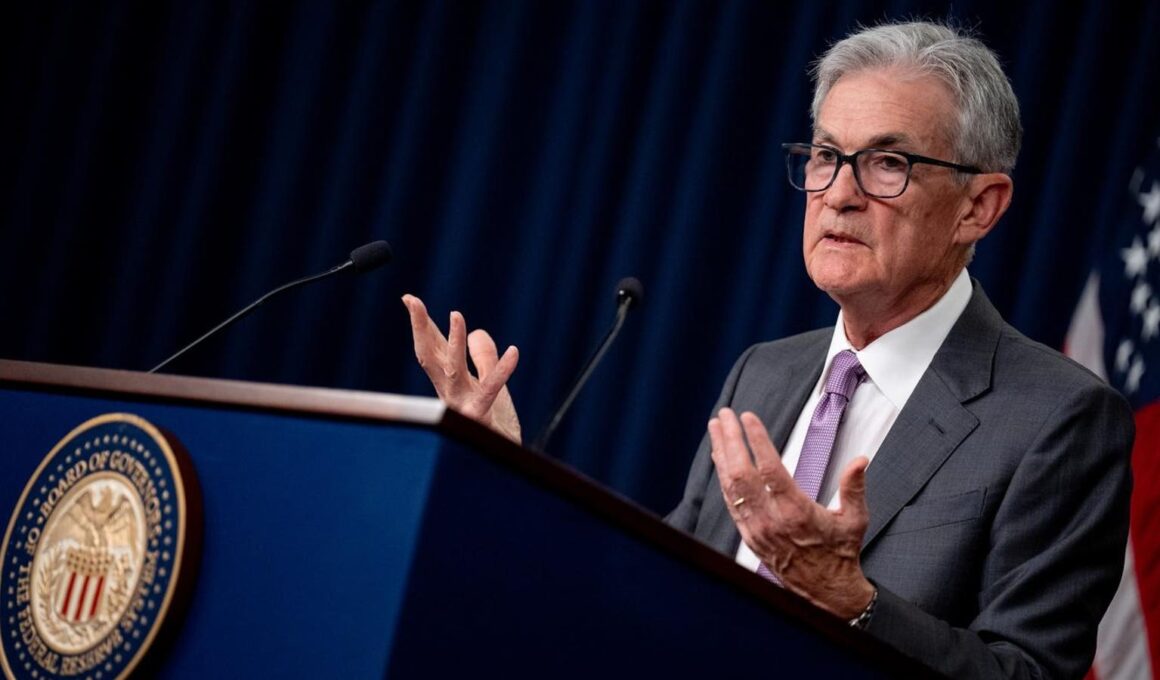Topline
History suggests it’s highly unlikely the Federal Reserve will undertake the rare step of lowering interest rates between set meetings of its rate-setting panel, according Bank of America’s top U.S. economist, as some called for immediate rate cuts after Friday’s poor jobs reports and the stock market slide rocked confidence in the direction of the U.S. economy.
Federal Reserve Chairman Jerome Powell speaks at a news conference on Wednesday.
Key Facts
Some experts like University of Pennsylvania professor Jeremy Siegel said the Fed should lower rates—a move typically used to boost growth—before the central bank’s September 17-18 meeting to address the weakening perception of the economy, and interest-rate futures contract traders reportedly priced in as much as 60% odds of a rate cut this week, though calls for a swift Fed reaction have abated as the stock market recovered some of its losses Tuesday.
But current conditions are “not even close” to support such an action based on recent history, Bank of America’s Michael Gapen wrote to clients Tuesday.
The Fed’s Open Markets Committee votes on the target federal funds rate at each of its 10 regularly scheduled annual meetings, but has the authority to do so outside of these conclaves.
Prior intermeeting cuts have “come amidst truly emergency conditions in the economy or financial markets,” noted Gapen, examining the seven between-meeting cuts dating back to the turn of the century.
Those include two during the beginning of the COVID-19 pandemic, two during 2008’s financial crisis, one immediately following the 9/11 attacks and two during the 2001 technology stock crash in which the Nasdaq Composite index fell 70% in a 15-month span.
“The bar for intermeeting cuts is extremely high and that conditions on the ground today do not warrant such action,” Gapen added, noting historical precedents suggest that today’s situation is “not even close” to warrant an emergency rate cut.
Key Background
Growth is slowing, but the U.S. just posted its 43rd consecutive month of strong labor growth, and July’s 4.3% jobless rate, though the highest in nearly three years, is lower than unemployment was for the entirety of 2008 to 2016. And the stock decline, even before Tuesday’s recovery, was hardly outside of the historic norm, as the S&P was only 8.5% below its July 16 all-time high, short of a 10% correction. The S&P enters correction territory once a year on average dating back to the 1930s anyways, according to Bank of America strategist Savita Subramanian. Still, the Fed operates on a dual mandate to keep inflation in check and maximize employment, and some think the decision to keep rates at their two-decade high of over 5% for the last 12 months even as inflation cooled was a mistake in terms of supporting labor market expansion. Rate cuts typically boost stock prices as companies’ profit margins improve with lower borrowing rates and more eager consumers, but some think intermeeting rate cuts can actually rattle the market further as it can signal panic at the Fed, causing further selling.
Tangent
It may be unlikely that the Fed cuts rates in coming weeks, but the market still expects strong action from the central bank at its September meeting. Federal funds rate futures contract trades price in a 100% chance of a cut next month, broken down into a 66% chance of a 50 basis-point cut and 34% odds of a 25 basis-point cut, according to CME FedWatch Tool. The Fed hasn’t lowered rates by 50 basis points at a normal meeting since 2008.
Big Number
25%. That’s the odds the U.S. enters a recession over the next 12 months, according to Goldman Sachs economists led by David Mericle. Though that’s an increase from Goldman’s prior 15% odds, risks for a significant downturn are “limited” considering economic data looks “fine overall” and the Fed has 525 basis points worth of cuts at its disposal.
Trump Media to the Saudi Arabian influence on golf and what real-life billionaires think of ” Succession.” Send tips to dsaul@forbes.com. Follow Saul for analysis on the biggest daily economic and stock market happenings, ranging from inflation data to tech earnings to deep-dives on hot button assets.
“>







